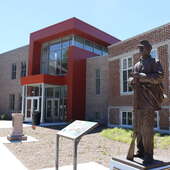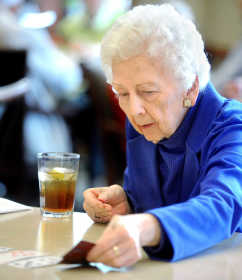More to explore
-

-

-
 Local News 5/3/24Cape Council finds insurance costs skyrocketing in coming year6Cape Girardeau’s City Council held a study session for the city’s 2024-25 proposed budget on Friday, May 3, at City Hall and learned insurance costs are skyrocketing upward. The City of Cape’s general fund was recapped for council members as the...
Local News 5/3/24Cape Council finds insurance costs skyrocketing in coming year6Cape Girardeau’s City Council held a study session for the city’s 2024-25 proposed budget on Friday, May 3, at City Hall and learned insurance costs are skyrocketing upward. The City of Cape’s general fund was recapped for council members as the... -

-

-
 Local News 5/3/24Cape Girardeau Historic Preservation Commission announces 2024 Endangered Buildings list4The 2024 Endangered Buildings List was announced Wednesday, May 1. The list was adopted by the Cape Girardeau Historic Preservation Commission on April 17. According to the commission, the list is “for the sole purpose of promoting public awareness...
Local News 5/3/24Cape Girardeau Historic Preservation Commission announces 2024 Endangered Buildings list4The 2024 Endangered Buildings List was announced Wednesday, May 1. The list was adopted by the Cape Girardeau Historic Preservation Commission on April 17. According to the commission, the list is “for the sole purpose of promoting public awareness... -
 Local News 5/3/24Cape woman faces charges after claims of punching woman, dog during dispute16A Cape Girardeau woman faces charges of animal abuse after allegedly punching a dog that was trying to protect another person during a dispute. The suspect later allegedly resisted arrest and police stunned her with a Taser to get her into a patrol...
Local News 5/3/24Cape woman faces charges after claims of punching woman, dog during dispute16A Cape Girardeau woman faces charges of animal abuse after allegedly punching a dog that was trying to protect another person during a dispute. The suspect later allegedly resisted arrest and police stunned her with a Taser to get her into a patrol... -
 Local News 5/3/24Mississippi Mingle returning next week for third yearCatholic Charities of Southern Missouri will host its third annual Mississippi Mingle in conjunction with Knights of Columbus on Saturday, May 11. The event will be from 11 a.m. to 4 p.m. at Knights of Columbus Hall, 318 S. Spanish St. in Cape...
Local News 5/3/24Mississippi Mingle returning next week for third yearCatholic Charities of Southern Missouri will host its third annual Mississippi Mingle in conjunction with Knights of Columbus on Saturday, May 11. The event will be from 11 a.m. to 4 p.m. at Knights of Columbus Hall, 318 S. Spanish St. in Cape... -

-
 Local News 5/3/24Cape man faces felony after allegedly sending nude image of woman to another man1A Cape Girardeau man is in jail on a $15,000 bond after police say he sent images of a nude woman to another man without permission. Nathaniel James Davis, 33, of Cape Girardeau was charged with the crime of nonconsensual dissemination of private...
Local News 5/3/24Cape man faces felony after allegedly sending nude image of woman to another man1A Cape Girardeau man is in jail on a $15,000 bond after police say he sent images of a nude woman to another man without permission. Nathaniel James Davis, 33, of Cape Girardeau was charged with the crime of nonconsensual dissemination of private... -
 Local News 5/3/24Cape sex offender charged with failure to register new addressRicky Scott, 41, of Cape Girardeau faces allegations he failed to register as a sex offender. The charges resulted from an investigation on Halloween in 2022, in which Scott was not compliant with Halloween restrictions, but Scott did not answer his...
Local News 5/3/24Cape sex offender charged with failure to register new addressRicky Scott, 41, of Cape Girardeau faces allegations he failed to register as a sex offender. The charges resulted from an investigation on Halloween in 2022, in which Scott was not compliant with Halloween restrictions, but Scott did not answer his... -
 Local News 5/3/24Poplar Bluff man sentenced to prison on drug chargeA Poplar Bluff man has been sentenced to 10 years in prison for selling methamphetamine. A release from Sayler Fleming, U.S. attorney for the Eastern District of Missouri, says U.S. District Judge Stephen N. Limbaugh Jr. ordered the sentence for...
Local News 5/3/24Poplar Bluff man sentenced to prison on drug chargeA Poplar Bluff man has been sentenced to 10 years in prison for selling methamphetamine. A release from Sayler Fleming, U.S. attorney for the Eastern District of Missouri, says U.S. District Judge Stephen N. Limbaugh Jr. ordered the sentence for... -
 Local News 5/3/24NB I-55 in Cape County reduced for bridge maintenanceNorthbound Interstate 55 in Cape Girardeau County, from mile marker 93 to mile marker 94 near Cape Girardeau, will be reduced to one lane with a 10-foot width restriction as Missouri Department of Transportation crews perform bridge maintenance....
Local News 5/3/24NB I-55 in Cape County reduced for bridge maintenanceNorthbound Interstate 55 in Cape Girardeau County, from mile marker 93 to mile marker 94 near Cape Girardeau, will be reduced to one lane with a 10-foot width restriction as Missouri Department of Transportation crews perform bridge maintenance.... -

-
 Local News 5/2/24Cape Girardeau officials question 'confidence' in city’s prosecuting attorney over criminal defense cases17Cape Girardeau’s top law official has questioned private practice actions taken by the city’s municipal prosecuting attorney, contending a conflict of interest. Chief of police Wes Blair pointed out in an April 17 email to city administration and...
Local News 5/2/24Cape Girardeau officials question 'confidence' in city’s prosecuting attorney over criminal defense cases17Cape Girardeau’s top law official has questioned private practice actions taken by the city’s municipal prosecuting attorney, contending a conflict of interest. Chief of police Wes Blair pointed out in an April 17 email to city administration and... -

-
 Local News 5/2/242024 Muddy River Marathon happening this weekendThe 2024 Muddy River Marathon will return Saturday, May 4, on a course that winds and bends through the streets of Cape Girardeau, beginning and ending at Century Casino Cape Girardeau, 777 Main St. There will be more than 400 runners competing this...
Local News 5/2/242024 Muddy River Marathon happening this weekendThe 2024 Muddy River Marathon will return Saturday, May 4, on a course that winds and bends through the streets of Cape Girardeau, beginning and ending at Century Casino Cape Girardeau, 777 Main St. There will be more than 400 runners competing this... -

-
 Local News 5/2/24Celebrate the Arts this Friday at River CampusA Celebrate the Arts event will be held Friday, May 3, at Southeast Missouri State University’s River Campus in Cape Girardeau. There will be a showcase of music, theater and dance pieces at 7:30 p.m. in Bedell Performance Hall and an open gallery...
Local News 5/2/24Celebrate the Arts this Friday at River CampusA Celebrate the Arts event will be held Friday, May 3, at Southeast Missouri State University’s River Campus in Cape Girardeau. There will be a showcase of music, theater and dance pieces at 7:30 p.m. in Bedell Performance Hall and an open gallery... -

-

-

-

-

-
 Local News 5/1/24SEMO, Mid-America Transplant honor organ donors with memorial at River CampusSoutheast Missouri State University, in partnership with Mid-America Transplant, hosted the families of organ and tissue donors and transplant recipients Thursday, April 25, for the unveiling of a new memorial at the university’s River Campus...
Local News 5/1/24SEMO, Mid-America Transplant honor organ donors with memorial at River CampusSoutheast Missouri State University, in partnership with Mid-America Transplant, hosted the families of organ and tissue donors and transplant recipients Thursday, April 25, for the unveiling of a new memorial at the university’s River Campus... -

-
 Most read 5/1/24Jackson man faces assault, harassment chargesCody Bredekamp, 29, of Jackson was charged with Class E felonies of third-degree domestic assault and first-degree harassment after a woman told police she “felt like she was being held hostage”, according to a probable-cause statement filed by...
Most read 5/1/24Jackson man faces assault, harassment chargesCody Bredekamp, 29, of Jackson was charged with Class E felonies of third-degree domestic assault and first-degree harassment after a woman told police she “felt like she was being held hostage”, according to a probable-cause statement filed by... -
 Most read 4/30/24Cape Girardeau County coroner’s attorney asks that cameras be barred from criminal hearings8Attorney Lynne M. Chambers filed a motion last week to bar the media from recording video and audio in the felony case against Cape Girardeau County Coroner Wavis Jordan. Chambers’ filing was in response to a request made to the court by KFVS12...
Most read 4/30/24Cape Girardeau County coroner’s attorney asks that cameras be barred from criminal hearings8Attorney Lynne M. Chambers filed a motion last week to bar the media from recording video and audio in the felony case against Cape Girardeau County Coroner Wavis Jordan. Chambers’ filing was in response to a request made to the court by KFVS12... -
 Most read 4/30/24Cracked windshield leads to Sunday shooting incident on I-55 that injured three; Sikeston man faces multiple felony charges3BENTON — A Sikeston man faces multiple felony charges following a traffic incident that resulted in him allegedly shooting at another vehicle and injuring three of its occupants while driving on Interstate 55 on Sunday, April 28, in Scott County. ...
Most read 4/30/24Cracked windshield leads to Sunday shooting incident on I-55 that injured three; Sikeston man faces multiple felony charges3BENTON — A Sikeston man faces multiple felony charges following a traffic incident that resulted in him allegedly shooting at another vehicle and injuring three of its occupants while driving on Interstate 55 on Sunday, April 28, in Scott County. ... -
 Most read 4/29/24Buckner-Ragsdale building begins new life as an event center10After a year of construction, The Buckner-Ragsdale Event Center at 132 Main St. in Cape Girardeau has opened. A preview event Thursday, April 25, served both to prepare staff for future events and to showcase the location to prospective...
Most read 4/29/24Buckner-Ragsdale building begins new life as an event center10After a year of construction, The Buckner-Ragsdale Event Center at 132 Main St. in Cape Girardeau has opened. A preview event Thursday, April 25, served both to prepare staff for future events and to showcase the location to prospective... -

-

-



